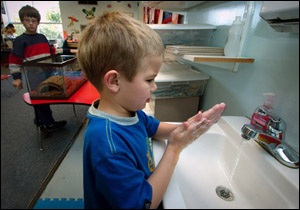CDC Features
Current Features
Healthy Pets Healthy People

Your relationship with your pet enriches your life. However there are a few important tips to keep in mind when you own a pet. Some animals may carry germs that can be transmitted to people. These are called zoonoses.

Pick the Right Pet
Before you purchase or adopt a pet, make sure that it is the right one for you and your family. CDC recommends that households with children under 5 years of age should not own reptiles, and pregnant women should avoid contact with pet rodents to prevent a virus that causes birth defects. Pregnant women should follow other special precautions. Immune-compromised persons and persons with HIV or AIDS should take extra precautions when choosing and handling pets.
Do research about the specific needs of the animal. Some questions to ask are: How much exercise does the pet need? How large will it become? Is the type of animal aggressive? What does the pet eat? How much will it cost for veterinary care? Do I have enough time to properly care for and clean up after the pet? What exactly does this pet need in its habitat to be healthy? Are pets allowed in my apartment or condominium? See information about adopting a pet* from the American Veterinary Medical Association.

Wash Hands Thoroughly after Playing with or Handling Your Pet and Pet Treats
Wash hands after cleaning the cage or aquarium as well as after handling an animal or pet treats. Many pets, such as dogs, cats, reptiles, rodents, and birds carry zoonoses. Be sure to wash your hands before handling food or eating. By keeping your pet healthy, you keep yourself and your family healthy. See the CDC Clean Hands site for more information.
Get Your Pet Early, Regular, and Life-long Veterinary Care
Providing regular, life-long care is key to a healthy pet and a healthy family. Keep up with vaccines*, deworming, and flea and tick control. Provide a good diet, fresh water, clean bedding, and exercise. Follow advice from your veterinarian*, who is devoted to your family's good health as well as your pet's. Ask questions.
Avoid Ticks on Dogs and Cats
Your pets may carry ticks that can spread diseases like Rocky Mountain spotted fever to people. Consult your veterinarian about ways to prevent ticks on your dogs and cats.

Practice Good Hygiene Around Your Pet
Pick up dog feces and dispose of properly. Keep young children away from areas that may contain dog or cat feces to prevent the spread of roundworms and hookworms. Change the cat litter box daily. Cover sand boxes so cats don't use them as a litter box. If you are pregnant, have someone else clean the litter box. Cats can carry a parasite that causes toxoplasmosis, a disease that can cause birth defects. Make sure to wash your hands after cleaning up after your pet and before eating or preparing food. Get more information on toxoplasmosis (![]() 203KB) and birth defects.
203KB) and birth defects.
Rabies is a deadly disease that can make both you and your pet sick. Get your pets vaccinated for rabies. Make sure your pet gets and wears a tag with its name and your phone number. Keep your pet in a fenced yard or on a leash. See more information about dog bites.
Keep Wildlife WildThough they may be cute and cuddly, don't encourage wild animals such as raccoons, prairie dogs, or wild rodents to come into your home by feeding them. Many wild animals carry zoonoses.
Teach Children How to Appropriately Care for PetsChildren under 5 years old should be supervised while interacting with animals. Teach children to wash their hands after playing with animals. Children under 5 years old should be extra cautious when visiting farms and having direct contact with farm animals, including animals at petting zoos and fairs.
Spay and NeuterSpaying or neutering your pet is part of responsible pet ownership. It may help prevent some behavioral problems, minimize your or your family's exposure to unfamiliar animals attracted to a female in heat, and extend your pet's life.
Enjoy Your Pet!There are many health benefits of owning a pet. The companionship of pets can help overcome loneliness and depression. Pets can increase your opportunities for exercise and outdoor activities as well as opportunities for socialization. Therefore, regular walking or playing with pets can decrease your blood pressure, cholesterol levels, and triglyceride levels. Remember, healthy pets = healthy people!
Additional Information
- Healthy Pets, Healthy People
- Clean Hands Save Lives!
- Toxoplasmosis Fact Sheet
- Dog Bite Prevention
- Pet Health from the American Veterinary Medical Association
- Know some with a new pet? Send congratulations with a Healthy Pet eCard
Page last updated: May 12, 2008
Content source: National Center for Zoonotic, Vector-Borne, and Enteric Diseases
Content owner: National Center for Health Marketing
URL for this page: www.cdc.gov/Features/HealthyPets
*Links to non-federal organizations are provided solely as a service to our users. These links do not constitute an endorsement of these organizations or their programs by CDC or the federal government, and none should be inferred. CDC is not responsible for the content of the individual organization Web pages found at these links

